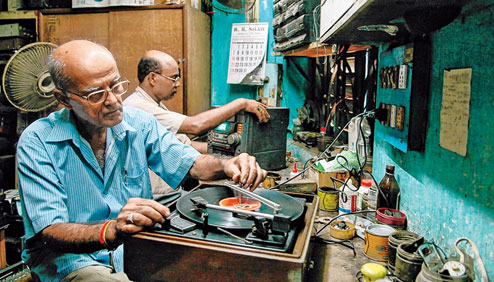 |
| Metro Music Hall, where old music systems are nursed back to life. Picture by Bishwarup Dutta |
A large, dark dusty room on the first floor of a ramshackle building in Metro Galli or Moti Sil Street, adjacent to Sacred Heart Church in Dharamtalla is crammed with shelves stacked with hundreds of sound boxes of all sizes, turntables, amplifiers and television sets. They will not turn into junk here. They will win a new lease of life.
This is an address known to many serious music lovers who prefer analogue to digital music because of its more human quality. To explain it in gastronomic terms, the difference between the two is comparable to that between broiler and free range poultry. The former tastes like boiled paper pulp, whereas the latter is more flavourful, if somewhat more fibrous. Or better still, think of fast food and haute cuisine and the unbridgeable gap between the two.
Ever since the emergence of CD players and discs after the “Big Bang” in 1983, gramophone records and turntables have become almost extinct with music companies stopping production.
Those who already had music systems with turntables never stopped playing them, although it has become increasingly difficult to keep them in good repair. Even engineers who work for well-known brands are not always up to it, one of the reasons being the scarcity of spare parts and the stylus.
But now that things have come full circle and CD sales have dropped phenomenally, analogue is stealthily making a comeback, although only devoted audiophiles keep their ear cocked for it. New turntables and amplifiers are way beyond budgets of most, so the easier and less expensive option is to go for old systems, turntables, sound boxes and amplifiers, and for the best results, mix-match.
The best place to go for this is Metro Music Hall, highly recommended by the likes of Amlan Dasgupta of Jadavpur University who helped set up the Archive of Recorded North Indian Classical Music.
The dark, dusty room in Metro Galli is its workshop, a couple of shops away from its showroom, which can be easily spotted as a gramophone with a brass horn is usually displayed outside it.
It is a sleepy little shop where everybody — from the elderly staff to the octogenarian owner — is relaxed. They know their clients are loyal.
The owner, Gopal Chandra Chakrabarty, says he opened shop in 1962, when he sold radiograms and radios of all brands. He sells and repairs TV sets of all brands as well, but he is best known for his music systems, and this is what attracted Satyajit Ray, the lyricist Pulak Bandopadhyay and Usha Uthup.
Metro Music Hall has won glowing encomiums from grateful customers.
Here’s what one of them, who chose to remain anonymous, has to say: “I had bought an Uher PS-950 turntable about three years ago from a second-hand turntable dealer after reading great reviews online. The problem was, I could not play it without getting a horrible background noise.
“The turntable, and my collection of vinyls, remained a part of the furniture until a friend recommended Metro Music Hall. I took it there and the problem was solved in about 10 days. It’s playing like a dream now. The problem was with the electrical connection, just as I had thought... but it needed an expert to spot and rectify it.”
Ashok Bhattacharya, 63, one of the nine experts at the Hall, says he joined the establishment in 1968 without any training. Then he learnt slowly through practice.
“All original parts are available at Chandni Chowk. I can repair Yamaha, Akai, Grundig…But Nakamichi systems are not available any longer,” he says.
Metro Music Hall can boast a huge collection of about 16,000 78 rpm records as well. These discs are waiting to find their voice again.










